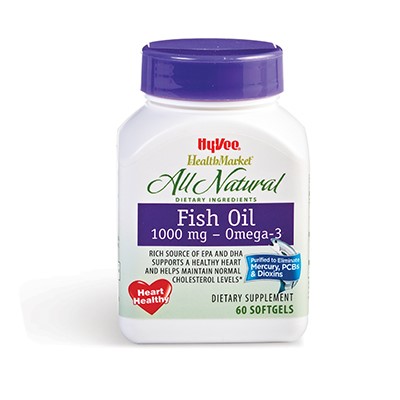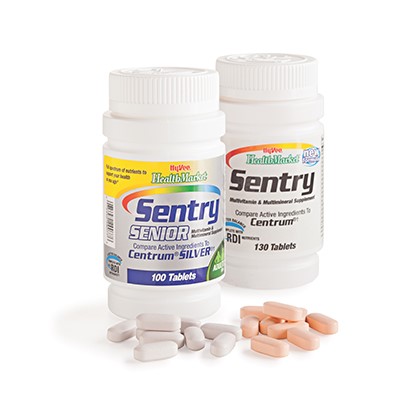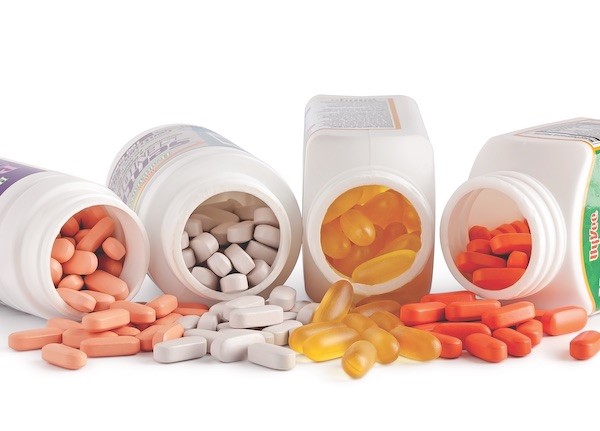Description
Let's play a game of This or That. We asked three of our registered dietitians what they thought about the choices below.
Do you have your own questions about vitamins and supplements? Our dietitians are ready to help. Find your local Hy-Vee registered dietitian.
Chewable or Solid Vitamins
From Hy-Vee Registered Dietitian Jena Demoss in Oakdale, Minnesota, "Chewable vitamins are designed for those who have difficulty swallowing a solid vitamin. They can be easier on your stomach and taste great—but be mindful of ingredients. They often contain sugar, artificial sweeteners and/or food dyes and typically have vitamins in a lower dose, which could not be as effective."
Omega-3 Supplements or Salmon

From Hy-Vee Registered Dietitian and Certified Specialist in Sports Dietetics Ryan Weiler in Shakopee, Minnesota, "Omega-3 fats are essential anti-inflammatory fats and we need about 1000 mg each day. Make sure you’re checking the supplement facts to ensure a proper dose. If you enjoy the taste of salmon, you will reap the benefits of naturally occurring omega-3 fats along with high quality protein and antioxidants like astaxanthin."
Multivitamin or Individual Vitamin

From Hy-Vee Registered Dietitian Jena Demoss in Oakdale, Minnesota, "Multivitamins can be used as a 'safety net' and are designed to help fill nutritional gaps that someone may not be getting from their diet, whereas individual vitamins zero in on more specific needs, from person to person, to help address specific nutrient deficiencies."
Also check out, Your Guide to Vitamins A, B, C, D, E, and K.
Calcium Supplement or Consuming Calcium Through Food
From Hy-Vee Registered Dietitian Jena Demoss in Oakdale, Minnesota, "A balanced diet including calcium-rich foods like dairy, dark green veggies and fortified foods may provide sufficient amounts of calcium. However, people who follow a vegan diet or have osteoporosis or digestive diseases may be at risk of not getting enough through food and should consider a supplement."
Whey Protein or Soy Protein
From Hy-Vee Registered Dietitian Jennifer Dunavan in Lincoln, Nebraska, "The whey vs soy protein debate is ongoing. While whey is animal sourced and soy is plant based, both provide all the amino acids needed to grow muscle. And a recent study found that after 2 weeks of use, both soy and whey had similar, desired effects on body composition."
Also check out, 16 Protein Shake Recipes That Make You Want to Workout.
Hyvee Dietitian Expert Tip
When it comes to whey protein, opt for whey isolate which is filtered to a greater extent to remove the lactose.Vitamin D Supplement, Food, or Sunshine
From Hy-Vee Registered Dietitian Jennifer Dunavan in Lincoln, Nebraska, "Our immune system needs vitamin D to fight off viruses. Sources include sun, foods and supplements. Sunshine offers the best natural source of vitamin D but prolonged sun exposure increases skin cancer risk. Foods higher in vitamin D include eggs, sardines, tuna, salmon, fortified milks & cereals. Supplements can help meet the daily vitamin D recommendations of 600 IU for adults and 800 IU for older adults."
Collagen Supplement or Bone Broth
From Hy-Vee Registered Dietitian and Certified Specialist in Sports Dietetics Ryan Weiler in Shakopee, Minnesota, "Collagen has benefits for healthy-looking hair and nails, minimizing skin wrinkles, wound repair, and even easing joint pain. Powder supplements are a versatile and convenient way to boost beverages like coffee, tea or a smoothie. Bone broth is not only a natural source of collagen, but also rich in minerals like magnesium, calcium, potassium and phosphorus."
Also check out, 5 Foods That Promote Natural Collagen Production.


